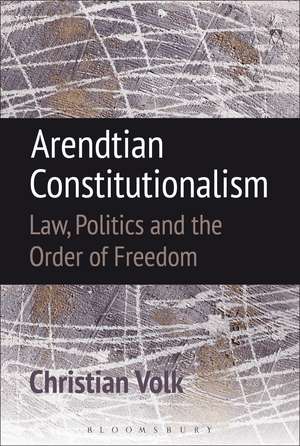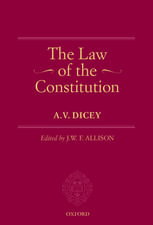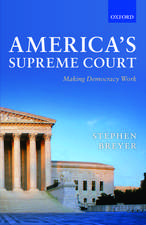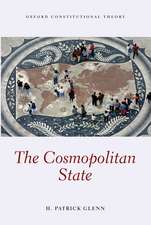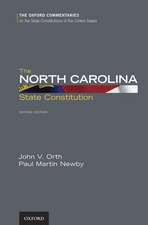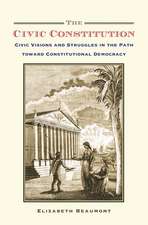Arendtian Constitutionalism: Law, Politics and the Order of Freedom
Autor Christian Volken Limba Engleză Paperback – 25 oct 2017
Toate formatele și edițiile
| Toate formatele și edițiile | Preț | Express |
|---|---|---|
| Paperback (1) | 253.67 lei 6-8 săpt. | |
| Bloomsbury Publishing – 25 oct 2017 | 253.67 lei 6-8 săpt. | |
| Hardback (1) | 543.25 lei 6-8 săpt. | |
| Bloomsbury Publishing – 29 iul 2015 | 543.25 lei 6-8 săpt. |
Preț: 253.67 lei
Preț vechi: 289.30 lei
-12% Nou
Puncte Express: 381
Preț estimativ în valută:
48.54€ • 51.91$ • 40.47£
48.54€ • 51.91$ • 40.47£
Carte tipărită la comandă
Livrare economică 17 aprilie-01 mai
Preluare comenzi: 021 569.72.76
Specificații
ISBN-13: 9781509917716
ISBN-10: 1509917713
Pagini: 312
Dimensiuni: 233 x 155 x 21 mm
Greutate: 0.5 kg
Ediția:NIPPOD
Editura: Bloomsbury Publishing
Colecția Hart Publishing
Locul publicării:London, United Kingdom
ISBN-10: 1509917713
Pagini: 312
Dimensiuni: 233 x 155 x 21 mm
Greutate: 0.5 kg
Ediția:NIPPOD
Editura: Bloomsbury Publishing
Colecția Hart Publishing
Locul publicării:London, United Kingdom
Caracteristici
This unique book examines Arendt's work and reconstructs her ideas through political, legal and constitutional theory.
Notă biografică
Christian Volk is an Assistant Professor of Political Theory and the History of Ideas at the University of Trier.
Cuprins
Introduction 1. The Paradoxes of the Nation-State I. Introduction II. The Paradox of the Right to Self-determination III. The Paradox of De-assimilation and De-naturalisation IV. The Paradox of Rightlessness V. The Paradox of Human Rights 2. The Concept of the Nation in Hannah Arendt's Thought I. Introduction II. Arendt and the Social Question -A Political-theoretical Readjustment A. Revolution and Discourse B. Sovereignty and Misery C. Misery and Consensus III. The Concept of the Nation and the Volonté Générale A. Arendt, Rousseau and the French Revolution B. General Will and Alienation C. The Internalisation of the Political 3. Law and the Modern State - Hannah Arendt on the Trail of Max Weber I. Introduction A. In Which Line of Tradition to Think About the State? Neither Hegel nor Elias B. An Initial Plea for Max Weber II. On the Origin of the Modern State A. State and Modern State in Weber B. Arendt and the Genealogy of the Modern State III. On the Rationality of Law A. What is Rational Law? A Look at Weber's Sociology of Law B. Arendt and Rational Law 4. Hannah Arendt's Critique of Popular Sovereignty I. Introduction II. Popular Sovereignty and the Law A. The Political-theoretical Architecture of Arendt's book on Totalitarianism B. Arendt and the Sources of Juridification C. Nation and Law III. Popular Sovereignty and Politics A. Politics in Mass Society B. Mistrust and Authority C. Mass Movement and Power 5. The Order of Freedom: On the Dehierarchisation of the Relationship Between Law and Politics I. Introduction II. Arendt's Understanding of the Political A. Arendt and the Normativity of the Political B. From the Power of Judgement to the Procedural Rules of the Political System III. Arendt's Theory of Law A. The Concept of Law: Relationship versus Substance B. What is Legitimate Law? C. Arendt's Demanding Concept of Political Enabling
Recenzii
...the book is a great success. Through an incredibly rich and knowledgeable interpretation of Arendt's work, Volk offers new perspectives on her concepts of law and politics, and develops a distinctive approach for thinking about legitimacy and democracy today.
Overall, this is an excellent, thoughtful and detailed engagement with Arendt's work that will become a clear point of reference for those who wish to understand her work on the state and legality and who then wish to deploy it to analyse contemporary global politics.
In perhaps the most ambitious book on Hannah Arendt to appear in recent years, Christian Volk presents an Arendt of our times.
This well-written volume has a clear structure and gives the reader a rich and innovative interpretation of Arendt's political and constitutional theory.
Overall, this is an excellent, thoughtful and detailed engagement with Arendt's work that will become a clear point of reference for those who wish to understand her work on the state and legality and who then wish to deploy it to analyse contemporary global politics.
In perhaps the most ambitious book on Hannah Arendt to appear in recent years, Christian Volk presents an Arendt of our times.
This well-written volume has a clear structure and gives the reader a rich and innovative interpretation of Arendt's political and constitutional theory.
